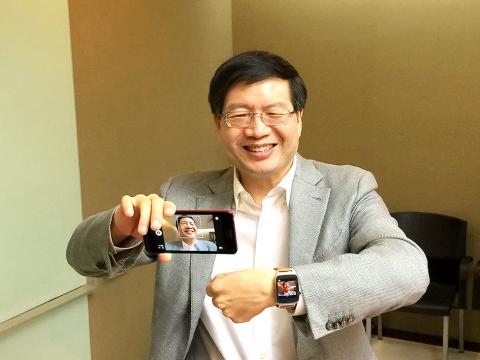Asustek Computer Inc (華碩) yesterday launched its new Transformer Book Chi series as part of an effort to double shipments of its two-in-one detachable devices to 6 million units this year, a company executive said yesterday.
“As of recently, our Transformer Book T100 launched in October 2013 has shipped more than 3 million units and we have confidence that the shipment of the new Transformer Book Chi series will outperform T100’s record,” Asustek chief executive officer Jerry Shen (沈振來) said at the product launch in Taipei.
Shen said the Transformer Book T100 served as a key growth driver for the company last year, adding that not only did the product make impressive sales, it also accounted for 20 percent of the firm’s total revenue.

Photo: CNA
“We hope the revenue of tablet-notebook hybrid devices will increase by 20 percent to 30 percent this year, with the launch of the new Transformer Book Chi series product line,” Shen said.
Asustek also launched two new ZenBook models — Asus ZenBook UX305 and ZenBook Pro UX501.
Shen said the functionality and efficiency of the two models are better than rival Apple Inc’s MacBook Pro.
Shen said he nicknamed the 15.6-inch ZenBook Pro UX501 a “high-performance monster,” as the product is 2.06cm thick, but has an ultra-high-resolution — or 4K — display with an Intel Core i7 processor and gaming-grade graphics.
Asustek is upbeat that its PC segment will put up a strong performance this year, driven by sales of the new two-in-one devices, the ZenBook series, its Chromebook and its low-cost EeeBook, Shen said.
The company is set to launch a new Chromebook in the next quarter, Shen added.
Asustek’s goal is to achieve 15 percent growth in PC-related product shipments every year and to double PC-related product shipments within five years, Shen said.
According to market researcher TrendForce’s latest report, Asustek’s notebook shipments accounted for 11 percent of the market, or 19.3 million units, last year, ranking it fourth in terms of global notebook shipments, beating its rival Acer Inc (宏碁).
Separately, Shen said chipmaker Qualcomm being fined US$975 million by the Chinese government for violating antimonopoly laws is positive news for Asustek.
However, he declined to comment further on the news for the time being, saying that he would talk more about it at an investors’ conference set for Friday.
Asustek’s smartphone brand Pegasus, which launched a smartphone in China last month, uses Qualcomm’s processor.

Taiwan Semiconductor Manufacturing Co (TSMC, 台積電) yesterday said that its investment plan in Arizona is going according to schedule, following a local media report claiming that the company is planning to break ground on its third wafer fab in the US in June. In a statement, TSMC said it does not comment on market speculation, but that its investments in Arizona are proceeding well. TSMC is investing more than US$65 billion in Arizona to build three advanced wafer fabs. The first one has started production using the 4-nanometer (nm) process, while the second one would start mass production using the

A TAIWAN DEAL: TSMC is in early talks to fully operate Intel’s US semiconductor factories in a deal first raised by Trump officials, but Intel’s interest is uncertain Broadcom Inc has had informal talks with its advisers about making a bid for Intel Corp’s chip-design and marketing business, the Wall Street Journal reported, citing people familiar with the matter. Nothing has been submitted to Intel and Broadcom could decide not to pursue a deal, according to the Journal. Bloomberg News earlier reported that Taiwan Semiconductor Manufacturing Co (TSMC, 台積電) is in early talks for a controlling stake in Intel’s factories at the request of officials at US President Donald Trump’s administration, as the president looks to boost US manufacturing and maintain the country’s leadership in critical technologies. Trump officials raised the

‘SILVER LINING’: Although the news caused TSMC to fall on the local market, an analyst said that as tariffs are not set to go into effect until April, there is still time for negotiations US President Donald Trump on Tuesday said that he would likely impose tariffs on semiconductor, automobile and pharmaceutical imports of about 25 percent, with an announcement coming as soon as April 2 in a move that would represent a dramatic widening of the US leader’s trade war. “I probably will tell you that on April 2, but it’ll be in the neighborhood of 25 percent,” Trump told reporters at his Mar-a-Lago club when asked about his plan for auto tariffs. Asked about similar levies on pharmaceutical drugs and semiconductors, the president said that “it’ll be 25 percent and higher, and it’ll

CHIP BOOM: Revenue for the semiconductor industry is set to reach US$1 trillion by 2032, opening up opportunities for the chip pacakging and testing company, it said ASE Technology Holding Co (日月光投控), the world’s largest provider of outsourced semiconductor assembly and test (OSAT) services, yesterday launched a new advanced manufacturing facility in Penang, Malaysia, aiming to meet growing demand for emerging technologies such as generative artificial intelligence (AI) applications. The US$300 million facility is a critical step in expanding ASE’s global footprint, offering an alternative for customers from the US, Europe, Japan, South Korea and China to assemble and test chips outside of Taiwan amid efforts to diversify supply chains. The plant, the company’s fifth in Malaysia, is part of a strategic expansion plan that would more than triple